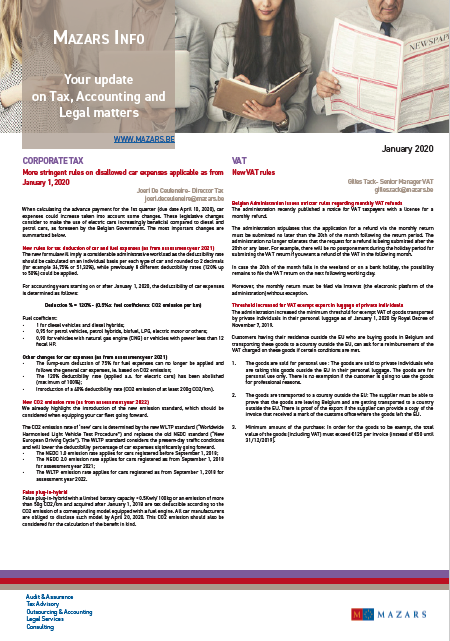
Mazars Info January 2020
CORPORATE TAX
More stringent rules on disallowed car expenses applicable as from January 1, 2020
When calculating the advance payment for the 1st quarter (due date April 10, 2020), car expenses could increase taken into account some changes. These legislative changes consider to make the use of electric cars increasingly beneficial compared to diesel and petrol cars, as foreseen by the Belgian Government. The most important changes are summarized below.
New rules for tax deduction of car and fuel expenses (as from assessment year 2021)
The new formula will imply a considerable administrative workload as the deductibility rate should be calculated on an individual basis per each type of car and rounded to 2 decimals (for example 36,75% or 51,32%), while previously 8 different deductibility rates (120% up to 50%) could be applied.
For accounting years starting on or after January 1, 2020, the deductibility of car expenses is determined as follows:
Deduction % = 120% - (0.5% x fuel coefficient x CO2 emission per km)
Fuel coefficient:
- 1 for diesel vehicles and diesel hybrids;
- 0,95 for petrol vehicles, petrol hybrids, biofuel, LPG, electric motor or others;
- 0,90 for vehicles with natural gas engine (CNG) or vehicles with power less than 12 fiscal HP.
Other changes for car expenses (as from assessment year 2021)
- The lump-sum deduction of 75% for fuel expenses can no longer be applied and follows the general car expenses, ie. based on CO2 emission;
- The 120% deductibility rate (applied a.o. for electric cars) has been abolished (maximum of 100%);
- Introduction of a 40% deductibility rate (CO2 emission of at least 200g CO2/km).
New CO2 emission rate (as from assessment year 2022)
We already highlight the introduction of the new emission standard, which should be considered when equipping your car fleet going forward.
The CO2 emission rate of ‘new’ cars is determined by the new WLTP standard ("Worldwide Harmonised Light Vehicle Test Procedure") and replaces the old NEDC standard ("New European Driving Cycle"). The WLTP standard considers the present-day traffic conditions and will lower the deductibility percentage of car expenses significantly going forward.
- The NEDC 1.0 emission rate applies for cars registered before September 1, 2018;
- The NEDC 2.0 emission rate applies for cars registered as from September 1, 2018 for assessment year 2021;
- The WLTP emission rate applies for cars registered as from September 1, 2018 for assessment year 2022.
False plug-in-hybrid
False plug-in-hybrid with a limited battery capacity <0.5Kwh/100kg or an emission of more than 50g CO2/km and acquired after January 1, 2018 are tax deductible according to the CO2 emission of a corresponding model equipped with a fuel engine. All car manufacturers are obliged to disclose such model by April 20, 2020. This CO2 emission should also be considered for the calculation of the benefit in kind.
VAT
New VAT rules
Belgian Administration issues stricter rules regarding monthly VAT refunds
The administration recently published a notice for VAT taxpayers with a license for a monthly refund.
The administration stipulates that the application for a refund via the monthly return must be submitted no later than the 20th of the month following the return period. The administration no longer tolerates that the request for a refund is being submitted after the 20th or any later. For example, there will be no postponement during the holiday period for submitting the VAT return if you want a refund of the VAT in the following month.
In case the 20th of the month falls in the weekend or on a bank holiday, the possibility remains to file the VAT return on the next following working day.
Moreover, the monthly return must be filed via Intervat (the electronic platform of the administration) without exception.
Threshold increased for VAT exempt export in luggage of private individuals
The administration increased the minimum threshold for exempt VAT of goods transported by private individuals in their personal luggage as of January 1, 2020 by Royal Decree of November 7, 2019.
Customers having their residence outside the EU who are buying goods in Belgium and transporting these goods to a country outside the EU, can ask for a reimbursement of the VAT charged on these goods if certain conditions are met.
- The goods are sold for personal use : The goods are sold to private individuals who are taking this goods outside the EU in their personal luggage. The goods are for personal use only. There is no exemption if the customer is going to use the goods for professional reasons.
- The goods are transported to a country outside the EU: The supplier must be able to prove that the goods are leaving Belgium and are getting transported to a country outside the EU. There is proof of the export if the supplier can provide a copy of the invoice that received a mark of the customs office where the goods left the EU.
- Minimum amount of the purchase: In order for the goods to be exempt, the total value of the goods (including VAT) must exceed €125 per invoice (instead of €50 until 31/12/2019).
GLOBAL MOBILITY SERVICES
Ending of the transitional period on May 1, 2020 in regard to the coordination of social security systems
On May 1, 2010 the Regulation 833/2004 on the coordination of social security systems entered into force. This Regulation provided for a transitional period of 10 years with regard to the implementation of the new coordination of social security systems within the EEA and Switzerland.
Taken into account the transitional period, the "old" Regulation 1408/71 continued to apply if
- the international employment situation remained unchanged;
- the person concerned has not opted to be submitted to Regulation 883/2004.
Persons who normally pursue an activity as an employed person in the territory of one Member State, and an activity as a self-employed person in the territory of another Member State, are prima facie concerned. In the situations mentioned in Annex VII Regulation 1408/71, such a person was subject to the legislation of both Member States. Unless the person concerned has opted to be submitted to Regulation 883/2004 and the situation remained unchanged, he/she should have remained subject to both legislations until April 30, 2020.
We remark that in September 2019 the ECJ has underlined that such situations however do not fall under the transition period of Article 87(8) Regulation 883/2004. This implies that Regulation 883/2004 was immediately applicable to those situations, meaning that - on the basis of article 13 of Regulation 883/2004 (see above) - as from May 1, 2010 these individuals should in principle have been solely subject to the legislation of the Member State where they exercised their employed activity.
This could have a significant impact in case a regularisation should be done for the past. In practice, the Member States can and might be willing to cover the past by applying article 16 of Regulation 883/2004. This would mean that no regularisation would be due for the past, and that the subjection to a single legislation would only apply going forward. Such an article 16 exception, however, requires the consent of both Member States involved and it is currently not clear how the social security authorities of the various Member States will apply this judgment.
As regards to third-country nationals, Regulation 883/2004 applies to them since January 1, 2011, and as a consequence, the transitional period will end on December 31, 2020.
As regards to multi-state activities in the capacity of employed person, the concept of "substantial activity" was introduced by Regulation 465/2012 and entered into force as of June 28, 2012. Pursuant to Article 87a Regulation 883/2004 as amended, the transitional period will end on June 27, 2022 (unless the person has opted that the transitional period no longer applies to him/her, on the conditions laid down by the said article).
Employees and self-employed workers still covered by the old system for the time being must take the initiative themselves and inform the competent authorities by May 1, 2020. Our global mobility department can assist you with an analysis of the applicable social security system and can calculate the impact of a change of social security system.
LABOUR LAW
New amounts non-recurring bonus
In our previous newsletter of December, we informed about the non-recurring bonus. Since January 1, 2020, the indexed amounts are published.
On the social aspect, the employee must pay a solidarity contribution of 13,07% on the amount granted. The employer must pay an employer’s contribution of 33%. These contributions are due as long as the bonus does not exceed a certain limit amount. Otherwise, the amount of the excess will be subject to the ordinary social security contributions.
For 2020, the maximum amount is 3.413 EUR for the social part (limit amount 2019: 3.383 EUR).
The tax authorities do not have to withhold any withholding tax as long as the limit amount is not exceeded.
For 2020, the new official limit amounts to 2.968 EUR for the withholding tax section (limit amount 2019: 2.942 EUR). Nevertheless, the tax authorities still have to confirm this amount.
KEEP IN MIND!
VAT
- VAT return December 2019 / Q4 2019: before January 20, 2020
LEGAL
- As mentioned in our previous newsletter, the new Code of Companies and Associations (CCA) is applicable as from January 1, 2020. For a lot of companies (BV/SRL, CV/SC), this means it’s time to change the corporate form mentioned on their company documents. Thus we remind to adapt your letterhead, e-mails, website and other communications,…


